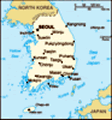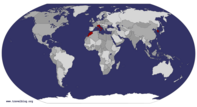Advertisement
Published: October 17th 2007
Welcome to South Korea, the coldest place on the 38th parallel! The job website advertised exotic “sub” tropical Jeju island as a honeymoon destination likened to Hawai’i….but I never saw snow on palms and tangerine trees in Maui!
Workwise, my days average thirteen hours and I am going on twenty-one days straight. I have a teaching assistant with me at all times that speaks mediocre English and spends most of her time text messaging, but nevertheless provides an important security blanket and assures that the kids don’t shout insanities or obscenities in Korean. The kids are notably more reverent and decorous than Americans students of the same age, though perhaps not to the degree that I expected. They roughhouse, shout and sneak away like any kids, but I have yet to hear anyone backtalk a teacher, insult another student or tattletale.
The first two weeks I was here, I had junior high students. Universal adolescent angst and students who aren’t used to any sort of public utterance resulted in a very sullen and taciturn class. Those two weeks were frankly boring, even for me. It’s not that the students weren’t creative, they are just programmed not to speak up
in class.
One student, who I nicknamed “Diabolique,” wrote two scathing pieces that kept us teachers laughing for days. She was supposed to write a diary about what she did in camp that day, but instead her paper said: “Today, I feel like talking about Japan. Japan is a dirty place. Maybe not the streets, but the people.” She continued recount the last hundred years of Japanese-Korean relations and bashed Korea’s former colonial oppressor to smithereens. It was a great history lesson and one of the most persuasive opinion pieces that I have ever read! There’s something to be said for simple language in politics! The other was called “The Love Square” in which I married the camp chief for money to give my dying mother a kidney transplant, even though I was in love with a married man.
The older students have an insatiable love for schmaltz. I tried to get them to rap “Fight for Your Right to Party” by the Beastie Boys in the talent show and they categorically refused. Instead, they sang a song by the British boy band Westlife called “My Love.” “So I say a little prayer and hope my dreams will
take me there, where the skies are blue, to see you once again, my love.” Imagine a group of fourteen year old boys singing that while holding hands. Toto, we’re not in Kansas anymore! They have also shocked me with their affinity for physical affection. Two of the guys literally preen each other in class, playing with each others’ hair and linking pinkie fingers. A little unnerving, but I am adapting!
Now I have a group of nine year olds, most of whom have an IQ higher than mine. One decided to be called Addison, as in the inventor “Tomus Addison.” His vocabulary is definitely more expansive than some of the staff at the camp. Another, who I call “mini MIT,” randomly ran after me as I was leaving the cafeteria yesterday to tell me that she didn’t want to visit Australia because of the UV rays. My favorite student who is not in my class is “Jenny,” whom I have nicknamed “the Rock.” Even though she is only five, she can lift most of the Korean TA’s and likes to punch the boys full force in the gut. She absolutely cannot speak any English except “I love you”
and therefore uses it as both a salutation and an insult. When it is actually a term of endearment, she puts her hands over her head in the McDonald’s arch, which is supposed to symbolize a heart.
I get along really well with the other teachers here, which makes some of the rough parts of the job more bearable. Several of the teachers are from Knoxville, Tennessee, as Emil Education (my Korean employer) has a “satellite office” there. This branch is actually a gas station owned by the brother-in-law of the head of the company. The other teachers have some great stories about turning in their passports at a service station cash register and carried unmarked envelopes full of documents in their suitcases. From Knoxville, there is Tim, a hyperactive EMT who likes to dress in camoflauge pants and a blaze orange stocking cap, his girlfriend Alan who takes to knitting when she is stressed, and Rebecca, a fifty year old bible thumper who wrote me off when I didn’t recognize the name of her “healer” who happens to be from Oklahoma.
There is Steven, a hard drinking Irish Catholic from North Carolina who boxes as a hobby
and disciplines like a drill sergeant, Anne, a Canadian artist who is about to start a master’s in fine arts for which her thesis will involve her splitting her personality into five parts to represent the five media that she works in, and Jonathan, a kiwi accounting student who spends every spare second studying Chinese or sleeping. We balance each other’s extremities and actually make a pretty good team.
One of the teachers’ greatest pastimes is ribbing the Koreans for their English, which we not-so-affectionately refer to as “Konglish.” Me Tarzan, you Jane. Any word that has less than three letters is considered ancillary and is axed. For example, the camp’s motto is: “Do something better than do nothing.” I think that this also pretty accurately illustrates the lack of communication between the camp administration and us teachers. How could they let that into a PowerPoint presentation when they have eight native English speakers on staff?
I am endlessly entertained by the way English is used in marketing here. Literally every product from cookies to face wash has a lengthy English tag line that uses as many positive modifiers as the campaign coordinator could muster. A bean curd pastry says “soft delicious morning feeling” and the local brew Cass represents the “sound of vitality.” The best that I have found yet was on a box of peanut butter cookies: “Please show Well-being and happiness with your beloved people by a peanut sand” (all typos were intended). I feel like I have been teleported to the sixties.
The greatest part of Korea is far and away the “bong” culture. “Bang” means room, and they have all kinds of these social meeting places here. The Norae Bang is akin to a karaoke bar, except that the rooms are private and the alcohol can be hard to scare up. We went with the Korean TA’s during the first week of camp, with no idea what to expect. We all payed a buck (a thousand won), took a seat and a number was keyed in…. disco lights started flashing, someone grabbed a tambourine and the most quiet TA in the camp burst into a heavily accented rendition of Whitney Houston’s “Greatest Love of All.”
The sauna, the jimjaebang, is another hot stop on the bang circuit. It is a multi-storied complex with rooms filled with hot saunas, dry saunas, whirlpool baths, fire hoses, lounging rooms, restaurants, cinemas, internet….almost anything you can imagine. I sat in a wet sauna that claimed to be at 140˚ C. They are open twenty-four hours and you can sleep stretched out in a lounge chair or on a mat. We only found time to go once in three weeks, but it was great because it is so warm, quiet and relaxing…everything that camp isn’t. The actually have one in the airport, and that is where I am going to spend the night layover that I have in Seoul.
So the one place that I haven’t gone in this meandering email is to food….I guess that’s because there’s not much to tell! I eat in the university cafeteria where the camp is located, so I can’t really judge. The staple is kimchi: fermented, rotten, garlicked, mouth burning cabbage. Breakfast, lunch and dinner all consist of a watery soup, rice and kimchi. We have gotten to eat out a couple of times. We went once to a great restaurant where you barbeque pork on tabletop grills and make lettuce wraps with peanut sauce. The waitress spoke no English except the phrase “one shot,” which she employed to instruct us how to both eat the wraps and drink our beer. We also went to a Japanese restaurant which served raw oysters and whole barbequed bite-sized crabs, shell and all. Those have been waging war in my stomach for about the last three days, and I have officially decided that I have had enough of Asian food. The local spirit is soju, like rice vodka, which is mixed with lemon schnapps and served warm.
Advertisement
Tot: 0.085s; Tpl: 0.011s; cc: 9; qc: 56; dbt: 0.0457s; 1; m:domysql w:travelblog (10.17.0.13); sld: 1;
; mem: 1.2mb








